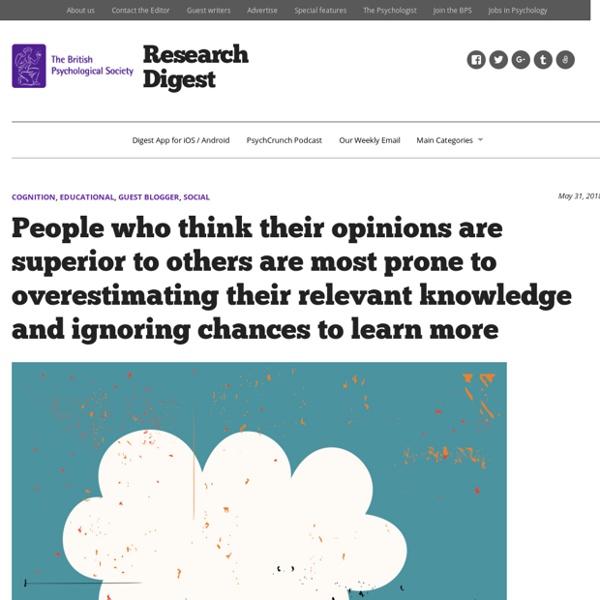People who think their opinions are superior to others are most prone to overestimating their relevant knowledge and ignoring chances to learn more

https://digest.bps.org.uk/2018/05/31/people-who-think-their-opinions-are-superior-to-others-are-most-prone-to-overestimating-their-relevant-knowledge-and-ignoring-chances-to-learn-more/#more-33991
Related: know about world
• How to Think Critically. Fake News
• Thoughts
• Critical Thinking
• Distorted Thinking
A quantum experiment suggests there’s no such thing as objective reality
Back in 1961, the Nobel Prize–winning physicist Eugene Wigner outlined a thought experiment that demonstrated one of the lesser-known paradoxes of quantum mechanics. The experiment shows how the strange nature of the universe allows two observers—say, Wigner and Wigner’s friend—to experience different realities. Since then, physicists have used the “Wigner’s Friend” thought experiment to explore the nature of measurement and to argue over whether objective facts can exist. That’s important because scientists carry out experiments to establish objective facts.
Truth, truthiness, triangulation: A news literacy toolkit for a “post-truth” world
We were guaranteed a free press, We were not guaranteed a neutral or a true press. We can celebrate the journalistic freedom to publish without interference from the state. We can also celebrate our freedom to share multiple stories through multiple lenses. But it has always been up to the reader or viewer to make the reliability and credibility decisions.
Macron condemned the rise of nationalism in front of Trump and Putin, warning that 'old demons are reawakening'
PARIS (Reuters) - French President Emmanuel Macron used an address to world leaders gathered in Paris for Armistice commemorations on Sunday to send a stern message about the dangers of nationalism, calling it a betrayal of moral values. With US President Donald Trump and Russian President Vladimir Putin sitting just a few feet away listening to the speech via translation earpieces, Macron denounced those who evoke nationalist sentiment to disadvantage others. "Patriotism is the exact opposite of nationalism: nationalism is a betrayal of patriotism," Macron said in a 20-minute address delivered from under the Arc de Triomphe to mark the 100th anniversary of the end of World War One. "By pursuing our own interests first, with no regard to others', we erase the very thing that a nation holds most precious, that which gives it life and makes it great: its moral values." There was no immediate response from either the White House or the Kremlin to Macron's comments.
How to improve your Critical Thinking skills: Interview with Dr. Gerald Nosich – Life Lessons
In this article I interview an expert on Critical Thinking, Dr. Gerald Nosich from the Foundation for Critical Thinking, who has been teaching Critical Thinking since 1977 to find out how we can improve our Critical Thinking skills. In this article you will learn: Let’s start at the beginning… Michael: What is Critical thinking?
Our oceans broke heat records in 2018 and the consequences are catastrophic
Last year was the hottest ever measured, continuing an upward trend that is a direct result of manmade greenhouse gas emissions. The key to the measurements is the oceans. Oceans absorb more than 90% of the heat that results from greenhouse gases, so if you want to measure global warming you really have to measure ocean warming.
Information Power
The mission of the library media program is to ensure that students and staff are effective users of ideas and information. This mission is accomplished: by providing intellectual and physical access to materials in all formats by providing instruction to foster competence and stimulate interest in reading, viewing, and using information and ideas by working with other educators to design learning strategies to meet the needs of individual students. --Information Power: Guidelines for School Library Media Programs (1988), p.1
For Years, Anita Hill Was A 'Canary In The Coal Mine' For Women Speaking Out
Anita Hill testifies before the Senate Judiciary Committee on Oct. 11, 1991, regarding Clarence Thomas' confirmation to the Supreme Court. AP hide caption toggle caption Anita Hill testifies before the Senate Judiciary Committee on Oct. 11, 1991, regarding Clarence Thomas' confirmation to the Supreme Court. Stories about sexual harassment in the workplace have dominated the news cycle this fall, but New Yorker journalist Jane Mayer remembers a time not that long ago when even the term "sexual harassment" felt new.
To think critically, you have to be both analytical and motivated
In a world where accusations of "fake news" are thrown around essentially at random, critical thinking would seem to be a must. But this is also a world where the Moon landings are viewed as a conspiracy and people voice serious doubts about the Earth's roundness. Critical thinking appears to be in short supply at a time we desperately need it.
50 Common Cognitive Distortions
3. Negative predictions. Overestimating the likelihood that an action will have a negative outcome. 4. Underestimating coping ability.
Related:



